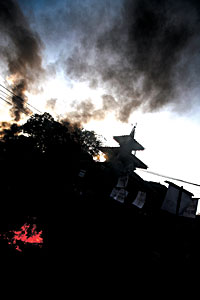 KIRAN PANDAY |
The president of the Traditional Religion and Culture Protection Committee lives up a narrow alley opposite the western gate of Pashupatinath. Shiva Sharan Rajbhandari does not seem to be a particularly hurt or angry man. The temple bhandari is clearly enjoying being in the limelight, is enthused by the support of "Hindus across the world" and thrilled at pushing the Maoists on the defensive.
Meeting him with an Indian television news crew is revealing, for it shows the symbiotic relationship between the jingoistic Delhi based channels which have blown up the issue and the local protestors.
Rajbhandari was all charm with the Indian reporters. He offered tea, took down numbers ("Can I call you if something happens here again?"), spoke in Hindi and then English for the network's different channels, posed on the terrace, and guided them to the next protest. "Tyres will burn, it will look good on tv," he winked.
The reporters played along, focusing on responses that said the Maoist intervention was a "threat to Hinduism" and asking constantly if it was an anti-India move.
Some distance away, the Gaushala road was blocked. Middle aged and young men in tight jeans and caps, the same ones you see during every road block, were negotiating with the police about what to burn. Starting with about 50 people, they began chanting slogans asking for Prachanda to "be hanged" as soon as they saw tv cameras. The crowd swelled to about 400 as speeches began.
So what has this drama been all about? Here is what the bhandaris said: this is a political intervention in temple affairs, there was no need for the Maoists to break with tradition in the appointment of priests, the allegations of corruption are false, the status quo should be restored.
The Maoists and temple administrators countered: the Indian priests had resigned voluntarily, what was wrong in getting qualified Nepali priests when the core issue was having a transparent financial system. They said Rs 30-35,000 was now being deposited daily while no one had any clue where the money went earlier.
Privately, pro-Maoist temple authorities said their mistake was in opening two fronts at the same time: appointing new priests and tackling the finances. They said the row had been played up by those who were scared of losing the chance to skim off the money.
The unstated Maoist ambition was to control the institution and get the money themselves, operating on the logic that the palace and NC did it in the past and now it was their turn. They were also sending a message to other temples and guthis across the country: if we can take over the Pashupati, you better fall in line. And they were playing the nationalism card.
The script went wrong for them domestically because Pashupati just became the latest in a series of actions that created a fear that the Maoists are out to capture and control all institutions. Local protests assumed a political colour that they may not have got sometime back.
The Maoists anticipated the Indian reaction, in fact it suited them because it gave them a chance to tell the cadre how they were the only ones resisting Indian hegemony. But what they perhaps did not expect was that the media-induced political pressure would get so intense from Delhi.
The BJP's reaction is natural because this is their constituency. It comes at a time when they have encouraged the formation of the Nepal Janata Party, headed by a former TMDP leader. Hindu right leaders in Kathmandu say that after years, they hit on an issue on which there was broad support and this could be a turning point in reviving their politics.
Mulayam Singh Yadav's visit was a coincidence. But Mulayam advising Prachanda to respect "Hindu sentiments" is ironic because he has often faced accusations of not having done so in his own UP. He fired at Hindu karsevaks in Ayodhya in 1989-90, which fuelled the Ram Janmabhoomi movement. Yadav relies heavily on the Muslim vote and is often called 'Maulana Mulayam' by BJP leaders.
As negative reaction poured in across the Indian political spectrum (from the secular lobby to Hindutvabadis) the Maoists realised that they were alienating too many people at the same time. So they took recourse to their two-step forward, one-step back strategy and retracted the decision.
And so yet another week goes by in Nepal with all the attention focused on what is a non-issue even as the slide downhill continues.



